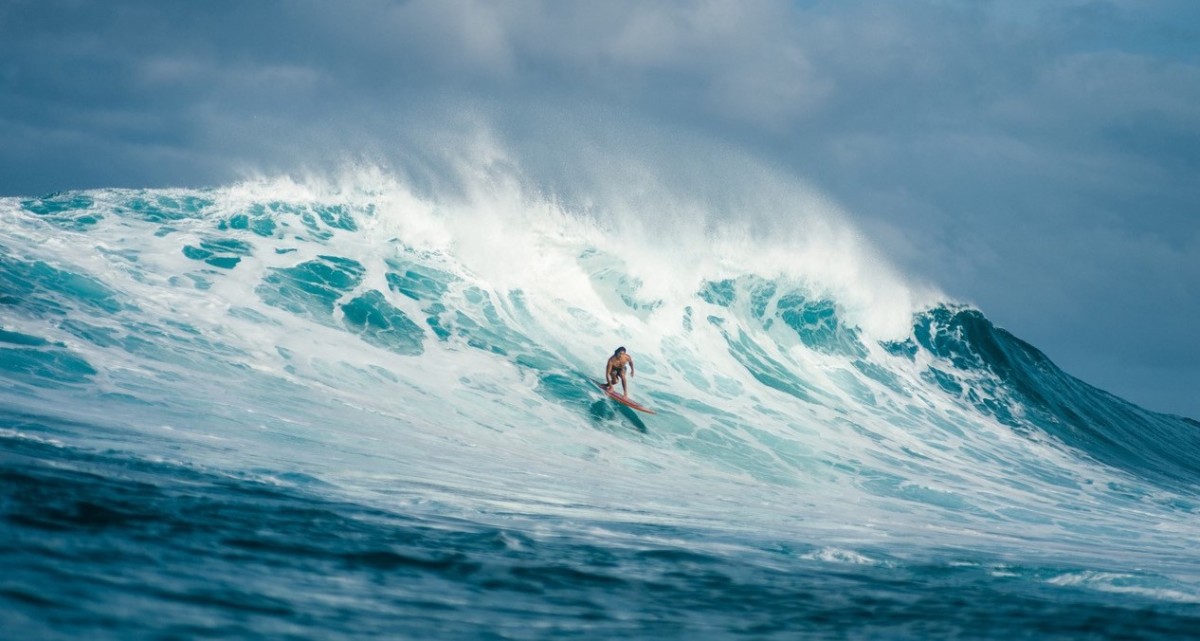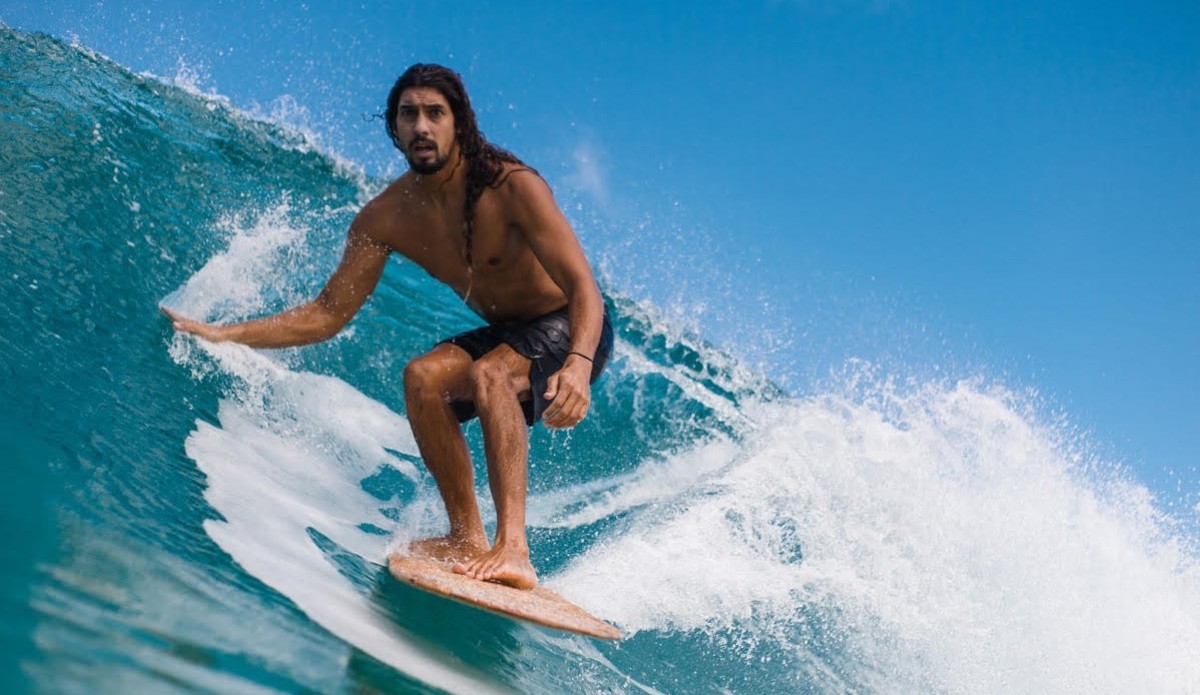Watching Lebron win his third world championship in the bubble doesn’t compare to seeing him play your city. Livestreaming Bad Religion’s 40 years of music isn’t nearly as much fun as bouncing around a sea of humanity in front of the stage.
But if there’s one event that has benefited from a pandemic pivot, it could be the Vans Triple Crown of Surfing. The Triple Crown has a storied 35-year history, an annual celebration of three Hawaiian breaks. It’s one of the most coveted titles in surfing. But simply watching the top 100 guys ride the same kinds of boards and tracking their cumulative results is a somewhat narrow view of wave riding.
When Vans launched the virtual Triple Crown, it was a refreshing reboot to the old event. Still sanctioned by the World Surf League, surfers upload two clips from each of the three Triple Crown venues – Sunset, Haleiwa and Pipeline, to be judged online. The season saw some groundbreaking clips submitted and current Mens World Championship Tour No. 1-ranked surfer John John Florence and Womens No. 2-ranked Carissa Moore are the first ever digital Triple Crown champs.
The new format freed the contest up from the limitations of the traditional structure. First off, female inclusion brings back the Womens Vans Triple Crown for the first time in ten years.
“That was long overdue,” says Scott Sisamis, Vans’ Global Director of Action Sports, “and the digital format helped cut through some red tape. Another great thing was the removal of qualifying points as a barrier. We were able to have the local community, which has several unbelievable surfers of all ages, races and genders, compete alongside the World Tour’s professionals.”

It also allows surfers to get their waves when the spot is firing. So, for instance, when Haleiwa looked like another planet at the end of December, the crew stacked clips in conditions far better than their 20-minute heats.
“I like the way we’re doing it this year,” Aussie Jack Robinson told Men’s Journal. Robinson is also the winner of the new ‘Fan Voting’ category with Brazilian, Tatiana Weston-Webb. He’s been a WSL rookie now for what seems like three years thanks to the pandemic. He won the Vans World Cup at Sunset in 2019 and was a favorite coming into the event.
“John John and I were talking about it the other day. You don’t always see the best surfing when you’re watching heats. This year’s Triple Crown gave us the option to go surf where we wanted, when we wanted. It freed us up. We had a full-on super session at Haleiwa. Slater was out there, and we were all really pushing each other. It allows for more creativity. Traditional competition doesn’t bring out the best in every surfer’s abilities. We feel like if it stayed virtual, there are a few things we could tweak for next year to make it even better.”
With dozens of clips submitted, Vans will dole out $200,000 to the winners. Florence won for his waves at all three venues. Moore won Haleiwa. Among the rest of the event for the females, World Tour surfer, Bronte Macaulay won Sunset and Hawaiian Moana Jones Wong won Pipe.
Perhaps most notably this year, the Triple Crown included surfers riding all manner of craft, which leads to far more interesting surfing. In some respect, this is far more “Vans” style, the wider perspective on ways to approach a wave that Vans has helped to foster over the last decade.
“I’ve always wanted to be a part of the Triple Crown. It’s arguably the most prestigious event in surfing,” says surfer/scientist/activist, Cliff Kapono, who takes a lot of pride in native Hawaiian roots.

“I enjoy surf competitions, but my role is more on the environmental and cultural side. I usually go over to the North Shore and participate in some of the gatherings, but I have never been part of the Triple Crown. And then I saw that they were doing it virtually, so I sent an email explaining that I wanted to participate by celebrating Hawaiian history and riding more traditional surfboards at all three venues.”
Kapono, 33, rode a traditional flat wooden alaia shaped by his friend, Brandan Ahuna.
“I think this year, the Triple Crown is more accessible to Hawaiians. There aren’t a lot of native Hawaiians on the tour.”
Now it wasn’t likely that Kirra Seale longboarding at Haleiwa was going to win, but the sight of a graceful lady tiptoeing to the nose on a peeling right nicely compliments all those Pipe pig dogs. It’s electrifying to watch Dane Gudauskas speeding across Sunset lines on a whacky 4’3″ nub of a surfcraft.
The range of entries included big wave woman Raquel Heckert, a Quiksilver In Memory Eddie Aikau alternate, and former WSL surfer turned big wave pioneer/LGBTQ hero, Keala Kennelly.
“One of the most exciting things we saw this year was Moana Jones Wong at Pipe,” adds Sisamis, of the young woman who battles among the crowd of guys each winter to get waves at Pipe.
“Surfing history is being made and surfers like Moana are driving it. We were able to look at competition through the lens of experimentalism and progression. This freed up surfers on their approach to each location as well as the type of surf craft they chose. This will continue to be an extremely exciting element for future Digital Triple Crowns.”
2020 Vans Triple Crown of Surfing Winners
-
- Overall VTCS Male Winner: John Florence
- Overall VTCS Female Winner: Carissa Moore
- Haleiwa Male Winner: John Florence
- Haleiwa Female Winner: Carissa Moore
- Sunset Male Winner: John Florence
- Sunset Female Winner: Bronte Macaulay
- Pipe Male Winner: John Florence
- Pipe Female Winner: Moana Jones Wong
- Fan Voting Male Winner: Jack Robinson
- Fan Voting Female Winner: Tatiana Weston-Webb
from Men's Journal https://ift.tt/3r040BD
No comments:
Post a Comment